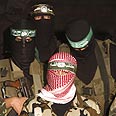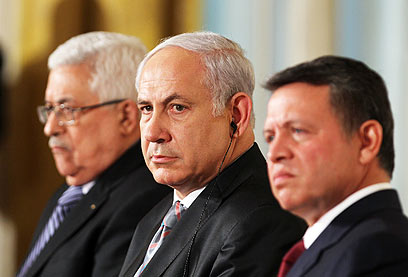
West skeptical over peace prospects
After uncountable attempts to achieve Mideast peace, US and British newspapers spread blame all around - at Palestinians, Israel, even Iran. Some still trying to remain optimistic
The world media has dealt at length on Friday with the launch of direct talks between Israel and the Palestinians in Washington. Newspapers covering the region, like many of their Israeli counterparts, have expressed skepticism that the objectives of the talks will be achieved.
"Given the history of failure, it is easy to be cynical about the latest search for a peace settlement in the Middle East," wrote a Telegraph editorial, which despite this maintained an air of optimism.
"Yet the talks that began yesterday in Washington at least opened auspiciously, with both sides anxious to demonstrate a willingness to negotiate. (Prime Minister) Benjamin Netanyahu's declaration that he and (Palestinian President) Mahmoud Abbas, the Palestinian leader, are "partners in peace" was encouraging, as was Barack Obama's declared commitment to the process."

At least talks off on right foot (Photo: GPO)
The Telegraph noted, however, " These are the first face-to-face talks for almost two years, and Mr Netanyahu spoke of his readiness to "walk a long way in a short time" and to 'forge a new beginning' – even though, in reality, the two sides are trying to fill in the outlines of an agreement first reached in 1993."
British mind's eye, the fog surrounding the continuation of the West Bank settlement construction moratorium is overshadowing the positive declarations coming from Washington.
"The path to peace is strewn with obstacles – especially the imminent resumption of building by Jewish settlers on disputed land in the West Bank. Israel's self-imposed moratorium on these developments expires on September 26. If Mr. Netanyahu is serious about wanting to 'find a historic compromise that will enable both peoples to live in peace, security and dignity,' then this must be extended. Equally, the Palestinians need to recognize unequivocally the Israeli desire to live securely within their own borders."

Kiryat Arba on Wednesday. 'Hazy status of building freeze overshadowing talks' (Photo: Kiryat Arba Municipality)
The fact that the issue of Jerusalem was not raised in any of the speeches made on Thursday raised a few red flags in London, as Telegraph addressed the absence of one of the cornerstones of the conflict from the pre-talks declarations. "Even if the two sides agree the basis of a solution, the status of Jerusalem remains to be settled – the final piece of the jigsaw, and perhaps the hardest to make fit," wrote the Telegraph.
The shadow cast by hostile elements over the peace process and regional stability all together in the Middle East can be seen clearly from Britain: "Casting a shadow over the proceedings is Iran, whose nuclear program Israel considers an existential threat that must be confronted, not least because it emboldens Hezbollah and Hamas, Tehran's proxies in the region."
The editorial finished on an optimistic note. "President Obama was right to say that the hard work is only beginning: if the talks are to have any chance of success, he will need to put his shoulder to the wheel. Of course, we have been here before. But if not now, when?"
'Neither side shows real willingness'
A more pessimistic view could be heard read in the pages of The Guardian. Ian Black, the British newspaper's Middle East editor, wrote in his article, "Low expectations were reflected in the opening statements, but it was the US that sounded most determined to keep hopes alive in the face of profound skepticism in the Middle East and beyond.
Black took note of what he sees as a warning sent to both sides by US Secretary of State Hillary Clinton that her country cannot and will not impose a solution. "Her clear warning that the US 'cannot and will not impose a solution' will alarm those who believe that only thus will Israelis and Palestinians be able to wriggle out of what she called 'the shackles of history' to make peace."

The summit in Washington on Thursday (Photo: AFP)
The Guardian directed much of its criticism towards Prime Minister Netanyahu. Even though his speech at the opening ceremony of the talks was described by some as unprecedented in terms of the allusions to steps he may be willing to undertake, many remain unconvinced of his seriousness given the political makeup of his government coalition.
"Benjamin Netanyahu's familiar script reflected his dual need not to alienate the Americans or his rightwing coalition allies at home. So he hailed Abbas as a 'partner' while stressing the importance of security, and repeated his insistence on explicit recognition of Israel as 'a Jewish state' – a demand taken by many as a way of blocking the right of return of Palestinians who lost their homes in 1948 and 1967."
In conclusion, Black wrote, "Neither side signaled any readiness for concessions that could create forward movement in the talks, though it would have been surprising if they had at this stage."
Iran threatening peace prospects
The Wall Street Journal published an opinion piece by Republican Senator from Massachusetts Scott Brown presenting a much more cynical view on the prospects for the current round of peace talks to result in an agreement within the year.
Brown, unlike the British press, placed most of the blame not on the parties to the dispute, but on Iran. He asserts that Iran is a negative factor in the region that, if not neutralized, will not allow any progress towards a lull in the Middle East.

Ahmadinejad. The main hurdle to peace? (Photo: AFP)
"The fact that Palestinians finally agreed to direct negotiations, without preconditions, is a positive step. But let's not delude ourselves: There can never be peace in the Middle East with a nuclear-armed Iran," wrote Brown.
Though talks are just at their outset, Brown wrote, "I don't pretend to have all the answers on how to end the conflict between Arabs and Israelis, but I do know that it is doomed so long as Iran remains a menacing actor on the world stage."
The Massachusetts senator also drew upon his recent visit to Israel and the region. "While I was in the region, I traveled to Sderot, a small Israeli town near the Gaza Strip that has been a favorite target of Hamas rocket attacks since before Israel's unilateral withdrawal of all settlers and troops from Gaza in 2005. Part of my tour included an impromptu viewing of what is best described as a bunker-playground.
"There, throngs of children of all ages were playing games, swinging and practicing their jump-shot. Like everything in Israel, the scene felt very normal and familiar—that is, until I was reminded that the playground was ensconced in reinforced steel and equipped with a half dozen shelters and a broadcast system that allowed kids a 15-second warning for incoming rockets."
Brown called upon the American administration to understand that "Now is the time to ratchet up the pressure, to further isolate Iranian President Ahmadinejad, and to impose even more punishing sanctions on the Iranian economy."
- Follow Ynetnews on Facebook










